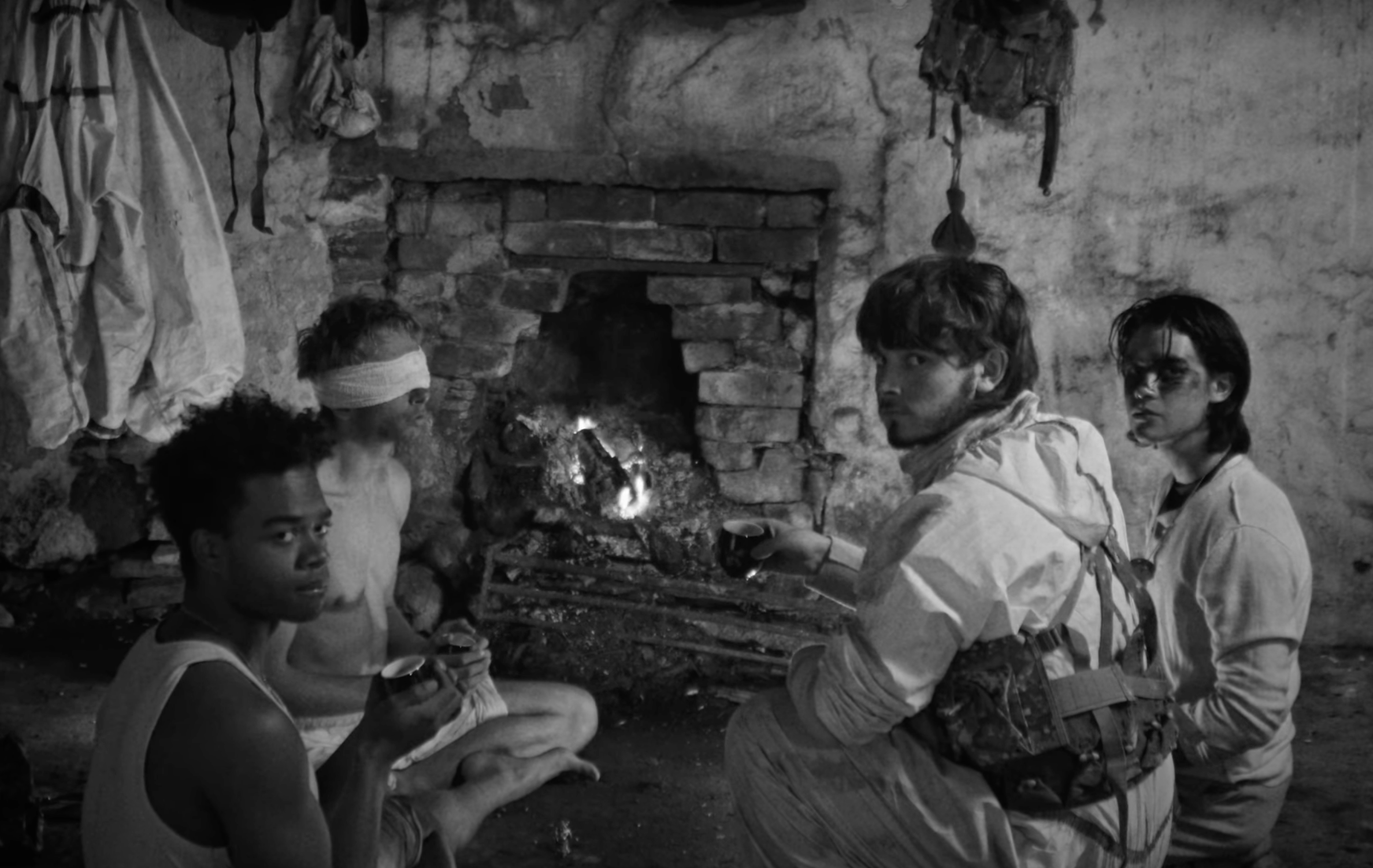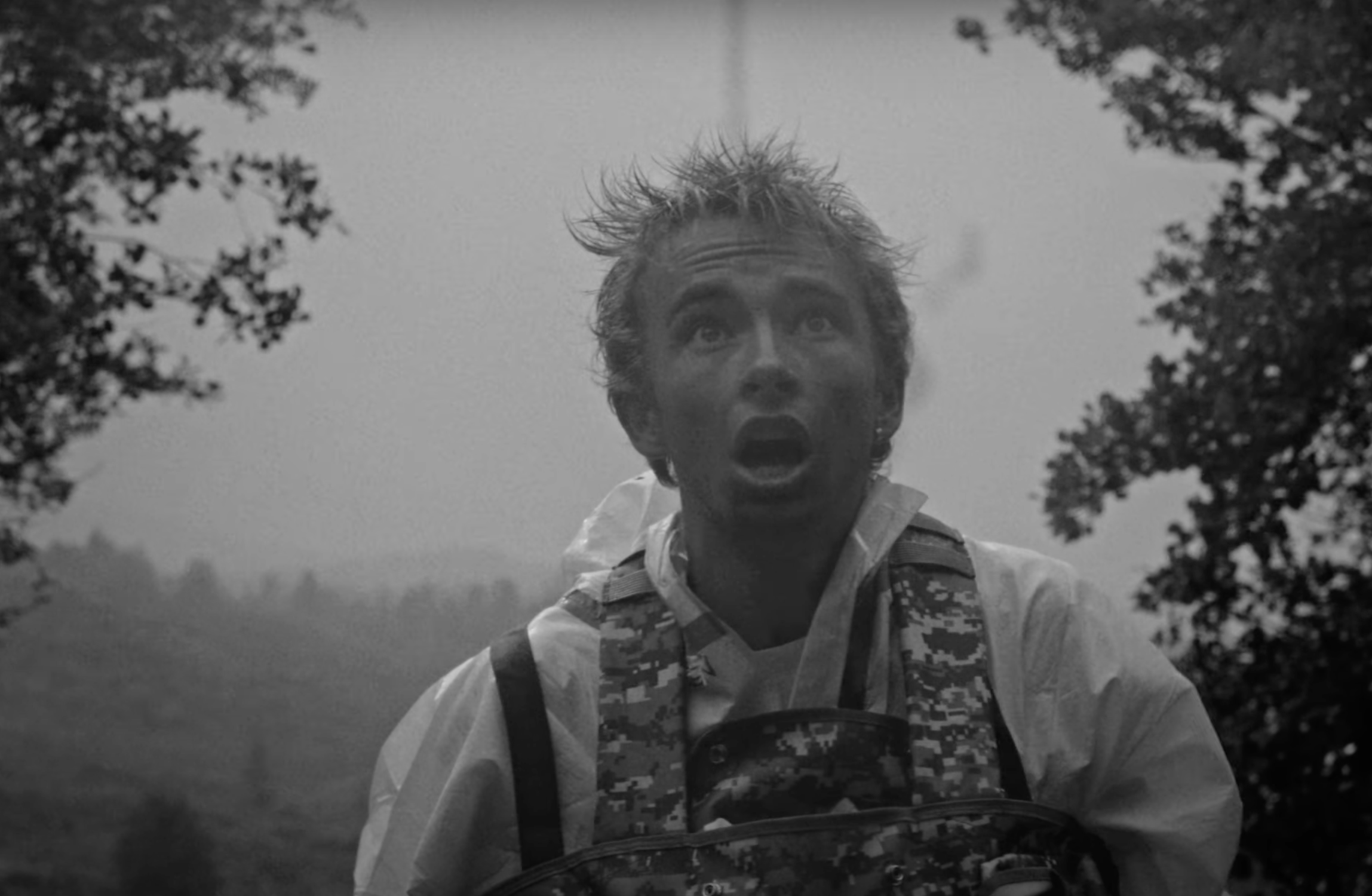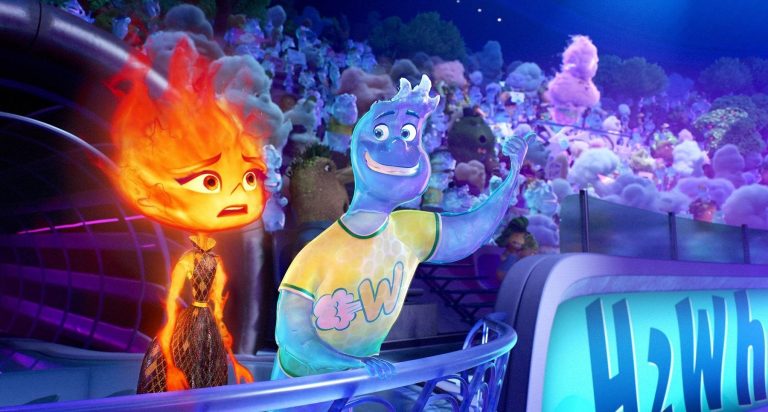Imagine this: you’re a little kid dressed up as a private, playing war with your buddies, except…it’s real. The guns are still just sticks and grenades just empty cupped palms, but the enemy is wholeheartedly believed to linger on the opposite side of a grassy no man’s land, traversing an adult-less world of child’s play doused in PTSD.
The eight young soldiers—or “shoulders” as one might accidentally say mid-rant—are practicing their military techniques with tree branches as they don’t have any weapons or even a lieutenant to tell them what the hell’s going on. All they know is they’re stranded in a northern lookout post amid idyllic, isolated Scottish hills, awaiting enemy attack. Whoever the “enemy” is.
The jingoistic band of boys might be far from frontline battles, but they soon discover—idle-eyed and bored of porridge—that the real battle is within. Both within their little unit and within their minds. Anti-war stories love to tousle with the psychological, and “Shoulders” is no different. It’s all very meta and Tarkovsky-esque—in the best way.
Jamie Flatters—actor, musician, and now director, with “Shoulders” marking his debut at the 2024 Clapham Film Festival— took a match to mainstream cinematic protocol and presented us with the ashes. To call it an arthouse Wes Anderson would be reductive, and a shame, because “Shoulders” is wholly unique to itself (though the guy throwing a tantrum in the background while the rest of the characters chat is giving the trampoline kid in “Moonrise Kingdom”).

Besides the multifaceted narrative of shifting power dynamics in the war-torn playground—and impressively elastic use of a micro-budget—”Shoulders” stands out for its theatrical use of imagination. Like in a stripped-down stage play, “Shoulders” is sparse with its props and set pieces, relying on the audience’s imagination and intellect (sorry aphantasiacs) to fill in the blanks. Risky, yet rewarding, feeding into the profound ego-murdering themes of existentialism, madness, death, and surrender—the latter of which transcends military definitions and waves the white flag to one’s soul.
“Shoulders” opens to the absence of a leader forcing the boys to democratize amongst themselves, cherry-picking the most aplomb soldiers to take the wheel and leave the recalcitrant to fend for themselves. Gunshots are (mis)heard, tensions rise, food supplies shorten, and oh—someone’s got this drug that’s making them suffer from paranoia. This is where the mind/soul battle comes in—a Game of Thrones playing Tag with who will crack up first. Mentally, physically, spiritually. Maybe put the pipe down?
The absurdity of “Catch-22” meets the claustrophobic paranoia-tinged psychology of “Apocalypse Now” in “Shoulders” (plus a similarly gravelly, Martin Sheen-esque voiceover), mingled with a little Cold War tension. All despite the fact there’s no visible war to speak of in “Shoulders.” Just eight guys running around a contextless pastoral paracosm in face paint. Each of them is piling in and ripping out their parts in the grand “shared delusion”, and this idea of the “whole” permeates Shoulders’ narrative domino of revelation.
Just as the individuals of the platoon (the leader, the psycho-freak walkout, the stoner, the stubborn-to-conversion) learn, “Shoulders” teaches us about unified separateness—how all of us are a cog in a larger universal machine; a wire or a receiver, coalesced to make up the whole radio (the metaphor adopted by Flatters)—yet all “one”.
Each of us the wire and the receiver, and the speaker and the transmitter and the voice box and every other part, all in one—our own whole radio in a world of whole radios making up one Supreme radio (“Shoulders” shows us this in a much prettier, avant-garde black-and-white film grain way). Like individual fingers on one shared hand (let go, let go, is what the characters urge each other—and us—to do) and simultaneously, each of us the hand itself. An inception of metaphors, curated for philosophy students, Buddhist scholars, and acidheads. Or people who just smoked a lot of weed in their parents’ basement while watching Ingmar Bergman.
The symbolism of the blind man leading the way was a great poster choice by Flatters, who presents us with a microcosmic manosphere of war, power, and spirituality wrapped up in one fist learning how to unfurl. Amid the harried atmosphere of betrayal, distrust, and pistols-at-dawn is the overarching allegory of divine acceptance, written and directed by a guy who’s clearly done mushrooms once or twice.
“Shoulders” is bravely experimental and almost playful in nature, not only breaking the laws of mainstream cinema but also the laws of its own diegesis— stick guns becoming handguns; time becoming suddenly malleable. A perestroika of fobbed-off rules and pushed boundaries, and like an adjustable ring, the narrative is circular and complete on your finger, yet not quite joining up. There’s still some wiggle room for interpretation and reflection, because like all stories, “the ending isn’t everything you see.”

“Shoulders” takes us through iterations of itself—the childish innocence of lads scrapping muddy-elbowed, later propelling into frantic handheld warzone darkness, spit-screaming about witnessing the death of men. Then asking: “What about the cloud no one has ever laid eyes on?” in that gentle meditative Hayao Miyazaki way. It runs, dances, and pauses for breath to the sound of an old TV scrabbling statically for reception, blurring reality, imagination, timelines, nightmares, and psychosis in a purposefully disorientating stoned state of delirium. All captured in beautiful academy ratio greyscale, with a glitching white noise violin string sound design enough to plunge anyone into the frenzied fuzz of mania or enchanting otherworld of spiritual surrender.
Every shot in “Shoulders” is methodical and intentional—like a precious collection of paintings where every brush stroke is honored—yet antithetically true to whimsical childlike spontaneity, having a little fun with the camera. Fun meets ego-death philosophy. Pepper in a few whip-pans and off-center angles, calling to mind John Ford’s advice to young Steven Spielberg in The Fabelmans: “When the horizon’s at the bottom, it’s interesting. When the horizon’s at the top, it’s interesting. When the horizon’s in the middle, it’s boring as sh*t.” Who needs a film school lecture in framing—just stick “Shoulders” on (and some Ford Westerns while you’re at it).
Something has to be said of the cinematography by Klára Simonová—dynamic, lyrical, polished, and just a little bit comical. True cine-poetry with enough kinetic movement to keep us up to pace with the constantly shifting narrative—the flux of anagnorisis, power dynamics, and, wait…so are we in the afterlife now?
For a passion project between just sixteen friends in one location with no running water, “Shoulders” is a pretty extraordinary feat. Even more so as a feature debut. If A24 came along and plucked Flatters on their next scout for arthouse directors, no one would be surprised.




![I Lost My Body [2019] Netflix ‘MAMI’ Review: A leisurely fairy tale with Profound Meanings](https://79468c92.delivery.rocketcdn.me/wp-content/uploads/2019/10/I-Lost-My-Body-Netflix-Review-768x432.jpg)
![The Queen Of Fear [2018]: ‘Sundance’ Review](https://79468c92.delivery.rocketcdn.me/wp-content/uploads/2018/01/39616779111_ac3ec36a8a_o-768x432.jpg)
![The Wind [2019] Review: A Menacing Portrait of Isolation](https://79468c92.delivery.rocketcdn.me/wp-content/uploads/2019/07/the-wind-1-768x432.jpg)
